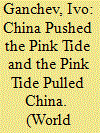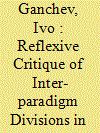| Srl | Item |
| 1 |
ID:
169474


|
|
|
|
|
| Summary/Abstract |
Existing concepts (e.g. ‘non-interference’ and ‘pragmatism’) remain too vague to provide explanations for China’s increasingly assertive security policy. To avoid this pitfall, this article adopts a narrower focus on Chinese security policy towards Africa. It explores two contrasting cases, namely Sudan/South Sudan and Mali to demonstrate that China: a) pursues security engagement only after obtaining permission by relevant parties (UN; regional organizations; target state); b) favours peacekeeping (stability) over peacebuilding (arbitrary support for emerging regimes); c) strategically interweaves its economic goals and security policy strategy. The article thus re-conceptualizes China’s new security policy towards Africa as ‘consultative peacekeeping.’
|
|
|
|
|
|
|
|
|
|
|
|
|
|
|
|
| 2 |
ID:
184235


|
|
|
|
|
| Summary/Abstract |
This article examines the rise of leftist ideology in Ecuador and Bolivia in light of their deepening economic relations with China from 2005 to 2014. First, it reveals that market trends account for trade fluctuations but fail to explain Chinese investment in, and some loan deals with, Ecuador as well as loans to Bolivia. Second, it demonstrates how these forms of funding provided alternatives to U.S.-led international institutions, enabling Rafael Correa and Evo Morales to steer away from Western influence. Third, it contends that four factors led to a cyclic reinforcement of Chinese economic interests and the rise of leftist ideology in Ecuador and Bolivia, namely: mutual complementarity between China’s demand for energy/natural resource supply diversification and Pink Tide development agendas; U.S.–China geopolitical competition for influence in Latin America; China’s experience in engaging with leftist governments from developing countries; and anti-Americanism shaping national identity in Ecuador and Bolivia.
|
|
|
|
|
|
|
|
|
|
|
|
|
|
|
|
| 3 |
ID:
185640


|
|
|
|
|
| Summary/Abstract |
This article begins by re-opening the Third Great Debate which established division lines between mainstream (realist/liberal/constructivist) and Critical (neo-Marxist/neo-Gramscian) theories of International Relations based on their different assumptions about the nature of the international system: anarchy and hierarchy, respectively. The first half of the article argues that adopting common definitions of these concepts makes the anarchy–hierarchy debate theoretically irresolvable and further demonstrates that mainstream and Critical theories do not share an understanding of these terms neither between, nor within, their own traditions. The second half of this article challenges and aims to correct the interpretation of three key political thinkers, Halford J. Mackinder, W. E. B. DuBois and Norman Angell as appropriated within the inter-paradigm debates of International Relations. It argues that the respective associations of these thinkers with early realism, critical theories and early liberalism are intellectually misguiding because their works exhibit a common understanding of the ‘international’ across macro- and micro-dimensions, which is uncharacteristic of ‘-isms’. This shows that popular interpretations of pre-1919 works through post-1919 paradigms can obscure more than they reveal. These findings do not seek to present new ideas but to produce a reflexive critique of IR which illuminates some, perhaps unintended, counter-productive systemic effects that inter-paradigm divisions can have on the discipline.
|
|
|
|
|
|
|
|
|
|
|
|
|
|
|
|